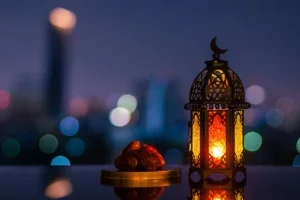An auspicious period of time for all Muslims across the globe, Ramadan is observed during the ninth month of the Islamic calendar, with the sighting of the moon signifying when this period is to begin and end.
While it is understood by pretty much every Malaysian, Muslims during this month carry out a strict fast from dawn until sunset, without eating or drinking anything during daylight hours. On the spiritual side, fasting is a private act of worship bringing about nearness to God.
In preparation for this spiritual period of time, which will officially begin next Tuesday, 12 March, we spoke to multiple Malaysian Muslims to ask them what methods they use to aid them in remaining strong and consistent with fasting during this month.

Image for illustration purposes only.
This is what 11 Malaysians revealed they do to help them cope with the fasting period in the month of Ramadan:
1. “Wake up early for sahur!”
“Make sure to wake up for sahur on time! Eat hydrating foods like fruits and veggies, and if you have space for it, a bit of rice helps a lot too. Try to avoid sugary and caffeinated drinks, as they tend to make you thirsty fast. Same goes for spicy food too.”
“Even out your water consumption between the time you break fast in the evening and sahur the next day, so your body absorbs fluids more efficiently and keeps you feeling refreshed when you fast.”
– Hafiz, 25 years old

Image for illustration purposes only.
2. “Distract yourself or just get busy with other things”
“My method is just staying busy or distracted by doing other things, such as work. Usually only the first few days are tough. After that, the body will get accustomed to fasting and won’t be hungry during the day anymore.”
– Saiful, 36 years old
3. “Make time in your day to slot in extra prayers”
“I think most people will say to level out what you consume, and I agree that it is super important, but don’t forget to pray when you can throughout the day as well. We have designated lunch times for working adults and recess time in school too.”
“So if your company doesn’t recognise letting you leave earlier for the month, or if you plan to stay till the end of your regular working hours anyway, excuse yourself to somewhere private and recite some prayers that you remember by heart. You can also bring a Quran with you and spend some time reading verses during that free moment as well.”
– Rayyan, 44 years old

Image for illustration purposes only.
4. “Maintain proper habits during your eating window of time, not the fasting part”
“To be honest, when people think or talk about fasting, they will always focus on the not eating part – but not about the routine or habits that you have to maintain during the eating window.”
“What my family normally practices is to never skip sahur, which is the most important part to ensure you have enough energy to retain for the day. It’s actually a sunnah (encouraged practice) to push the sahur period to its end – so you eat right before the fasting window starts.”
“What you eat for sahur also matters; to eat whole foods, which digest at slower rate, it’s better as you feel full longer. Food like oats, nuts, and wholemeal bread are good for this. So avoid eating junk food and processed food for sahur. I personally will avoid eating heavy meal for sahur, so that I don’t feel sluggish when I start my day.”
“Its also important to have a proper drinking schedule so you can get the recommended amount in during the eating window. Just slot in two glasses for every few hours; during iftar, before tarawih, after tarawih, and during sahur! Finally, have a good nights sleep and enough rest to help you last throughout the day.”
– Aqilah, 27 years old
5. “I minimise going out when it’s not necessary”
“Conserving energy is extremely important during this time, so don’t go out of your way to make yourself tired for no reason. Talking less helps in terms of only interacting with people when you absolutely have to, whether it be for job-related purposes or chatting with your friends.”
“But I also make sure to not go out when it’s not necessary. I have a tendency to love going out and walk around places like shopping malls or parks. But for this month, I minimise it unless I am truly ultra bored, or if I want to get a quick walk in before we break fast in the evening.”
“My biggest suggestion is finding docile practices to do that are just as entertaining without making you feel like you have to waste energy unnecessarily. Watch a movie, browse social media, play a video game. It’s also just for one month. After that, you can get back to a more active lifestyle again.”
– Mawar, 29 years old

Image for illustration purposes only.
6. “Start eating less before Ramadan to kind of get your body used to it”
“Okay, it’s kind of late for me to throw out this suggestion now, but if you start eating less before Ramadan, it can kind of get your body used to the lack of consumption for long periods of time. Fasting is a spiritual practice – we all know that. So I think if you try fasting for a few days, or in intervals, maybe a few months before Ramadan, it can make a difference.”
“I know this can be hard for some people because it means scaling back on some of the bigger commitments you have in your life for that period of time surrounding food, but it will make a difference in the long haul.”
– Afiq, 28 years old
7. “Take vitamins and exercise mildly”
“This shouldn’t be something closed off just to the month of Ramadan, but to be frank, take as much supplements or vitamins as you need. They don’t even need to be anything wildly specific, just the common ones like Vitamin C, Zinc, Iron, Vitamin D, Calcium, and multivitamins also if you have them.”
“I feel like taking them after iftar would be the best for me, but I see no problem with taking it in the morning before sahur as well. But it literally does what vitamins are meant to do for you all year long anyways – provide you with the nutrients you may not be getting from your food.”
“I also recommend keeping your exercising schedule consistent. You don’t need to make alterations for it just because you are fasting, just scale it down to be lesser than usual. If it makes any different to some who could be scared of working out during the day, you can save it for the evening time also, so you get that big boost of energy before breaking fast.”
– Jeff, 32 years old

Image for illustration purposes only.
8. “Most of us work after sahur, so good sleep is important to keep one energised”
“Fasting is not a walk in the park, but it’s not undoable. However, to make things easier for me, I noticed that apart from limiting physical activities, the key also lies in your food consumption in the morning for sahur.”
“For me, I avoid sweets in the morning (or at least, take it minimally). Sugar boosts your energy but also drains it quickly before wearing off. I’ll also avoid caffeine at all costs. Since it’s dehydrating and we don’t get to rehydrate for another 14 hours prior to iftar, I take two to three glasses of plain water in the morning to keep myself rehydrated.”
“Truthfully, you can’t avoid feeling thirsty throughout the day, but by cutting down on sugar and caffeine, and slightly levelling up your intake of plain water, it helps. Last but not least, get enough sleep as possible before sahur. Most of us are working after sahur, so a good sleep (or at least sufficient sleep) is important to keep myself energised throughout the day without feeling fatigue.”
– Azri, 30 years old
9. “Get your day going early and all the most strenuous things out of the way first”
“My children say I do this because I’m old but it really makes a difference – wake up early and start your day. I think we can clearly say don’t miss sahur, but also how you plan your day is extremely important. If you know you have a heavy day set ahead of you, make sure you steer it properly so you’re not left dead tired and on the edge of your seat for iftar by 2pm.”
“If you wake up, get your day going early, and all the most strenuous things out of the way first. You’ll set up your day in a proper manner. I run a catering business, so I am out delivering orders (as usual) and get done by 8am sometimes. I then have my whole day to prep, construct, and execute my orders for the following days, or beyond.
“When you don’t make a gameplan from the start, it will be immensely tough.”
– Ihsan, 66 years old

Image for illustration purposes only.
10. “Exposing yourself to food does ignite some strength in you”
“I come from a blended extended family. So there have been times where we’ve gone to someone’s house in the daytime during the month of Ramadan for a gathering or outing. Of course we’re not going to tell them to not eat, but being around food sort of makes me stronger instead of acting as temptation. I like being around food and kind of standing my ground for this fasting time.”
“I wouldn’t say this is a suggestion for others to do, but hey, if you don’t mind being around it in a manner of like, where you have to see what food is present at a particular place, then why not.”
– Amir, 24 years old
11. “Shower more than what you’d normally do”
“I’m sure all Malaysian Muslims know that our weather can be pretty brutal. So taking a shower more than what you’d normally do during other months in the year helps freshen you up. I feel more energised and cooled down after I bathe, so why not? Of course don’t play tricks and accidentally drink the water, but other than that, it’ll help manage the temperature of your body if the heat becomes unbearable.”
– Fatin, 26 years old

Image for illustration purposes only.
For this period of fasting and showing reverence, we wish all our Muslim brothers and sisters a happy and blessed Ramadan ahead!
Also read: Differently-Abled Malaysian Celebrates Hari Raya On Mount Everest!










































